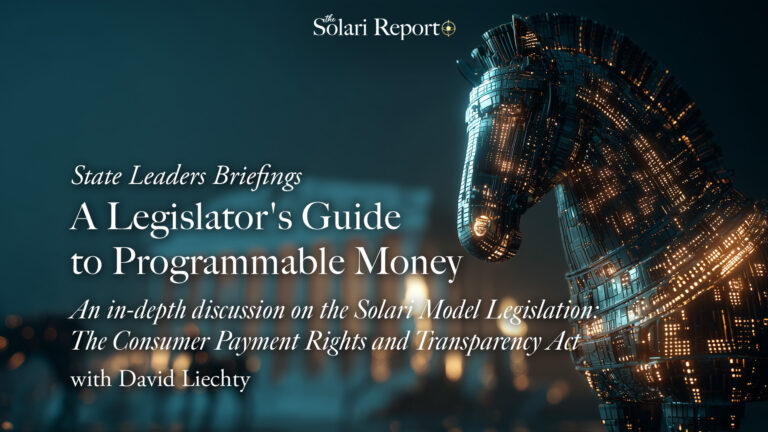“If imitation is the sincerest form of flattery, we’ve flattered reality enough. It doesn’t need any more. Reality needs a massive injection of imagination.”
“If a person can’t imagine a better world, he’s stuck with this one.”
“Hopelessness is an op and it’s planet-wide.”
~ Jon Rappoport
By Catherine Austin Fitts
Jon Rappoport has been bravely calling out fake science and medical-pharmaceutical cartel trickery since the 1980s, the decade in which the cartel carried out its beta test known as HIV/AIDS. Each subsequent “dud epidemic”—from West Nile to Zika to Covid-19—has relied on the same recognizable pattern of propaganda and fake science, but at the same time has gotten progressively bigger and bolder. As I have often said, “Crime that pays is crime that stays.”
As soon as a “novel coronavirus” began making headlines in early 2020, Jon knew the narrative was about to begin anew, but with one key difference. China’s overnight lockdown of 50 and then 100 million people suggested that this time, the instigators felt emboldened and had the infrastructure—including unified “wall-to-wall” messaging and a previously inconceivable enforcement capability—to make the lies stick. Jon readily admits that Covid-19 is the biggest con he has ever covered—the “con of cons.”
One of the biggest barriers to inventing our own reality and rejecting the globalists’ dystopic vision of digital slavery is, according to Jon, people’s psychological propensity to want to boil complex phenomena down to just one thing—including swallowing the one-virus-one-disease reductionism that has driven every “dud epidemic” since HIV. If we are going to stop the control grid, it is essential to understand that “Covid” is a soundbite cover term for phenomena that are far more complex. And if you want to shed the overly simplistic explanations fed to us by the old media, this week’s interview—as well as Jon’s six-part Solari series from 2020 on the creation of a false epidemic—will be indispensable.
Jon’s clear-headed analysis can also help you connect the necessary dots between the multifaceted and long-standing “great poisoning”—of which “Covid” is just the latest installment—and the planet-wide financial and governance coups that we are now witnessing and must find ways to reject.
In Money & Markets this week, Catherine and John Titus will cover the latest events and market developments. E-mail your questions for Ask Catherine or post at the Money & Markets commentary here.
Please join us this Thursday, March 3, for How Do We Stop the Control Grid? with Jon Rappoport.
Talk to you Thursday!
Related Reading:
Jon’s website: No More Fake News
Related Solari Reports:
The Creation of a False Epidemic with Jon Rappoport, Parts I–III
Creation of a False Epidemic – Part IV – The Worm Turns with Jon Rappoport
The Creation of a False Epidemic – Part V – We Are NOT in It Together! with Jon Rappoport






















































































































Awesome interview! Thank you both
Great interview. Thank you so much.
Your conversations with Jon are my favorite (also Dr. Farrell). Comparable to taking a long journey, quest, to seek answers provided by shamans of lost ages in the 21st century, the essential truth is revealed, the spell broken. The 21st century’s Wizard of Oz is exposed, a behemoth of fake reality integrated in all aspects of our lives, it’s quite a life changing discovery, treasure of hidden wisdom in this construct, 21st century age of a technocratic souless panopticon. You both exposed the shadows of the Plato’s cave of our age. And once deconstructed along with following the money, you cannot unsee it. It’s ubiquitous, explains people being exasperated, with expressions like “it’s absurd”, “sheer madness” without understanding it’s all a cover story, OP. And then I smile, laugh watching the shadows of our time coming fast and furious across the news wires, happy that I don’t live in the cave. Your wisdom gives me peace that “what’s essential is truly invisible to the eye. It’s only with the heart that one can truly see” as Antoine de Saint-Exupery wrote in “The Little Prince”. Thank you both, it’s the life saving but inspirational knowledge required to thrive in our time.
Thank you, Sandra. I often describe Jon as a Foo Dog standing guardian over reality https://nazmiyalantiquerugs.com/area-rug-guide/motifs-symbols/foo-dog/
Thank you, that was a profound and enlightening educational link. Indeed, John is a Foo Dog, how blessed we are to have his wisdom guarding us in this tumultuous time in history.
Really fabulous. Please consider making this public. In the meantime, here’s a “comedy video” that makes a lot of the same points and might be easier to digest for those “too hot to handle” topics that Jon alludes to in his video for people who aren’t ready to have their deprogramming ripped off like a band-aid. https://youtu.be/6G3nWyoQ5CQ. Comedy, ridicule and satire often go to places in the heart and mind where reason won’t be invited for a while. It’s why so many of the great comics are outcasts over time.
I think Titus is right in that Klaus Schwab et al are being set up as chew toys to be discarded, but as “they” are forced to abandon their mouthpieces they reveal more of themselves than they care to. Many hands being overplayed simultaneously it seems to me. Let’s pray enough people see it in time.
Great discussion/interview. The analogy of a partial response by accepting small victories as a good sign will lead to further enabling of the psychopaths is correct. Mr global is not in this for small losses.
Another wonderful interview between you and Jon, Catherine! 🙂 I could definitely relate to what he was saying towards the end, when he said that as a young boy there was a specific group of people his parents wanted him to spend time with, that he realized he wanted nothing to do with, as I feel that way about many of the people in the profession I used to work in, as so much of their lives revolve around money, money, money.
Re: No one ever fights back.
The majority did not, but some did. Some like CAF, Jon and other Solari guests survived to inspire others. Some became TIs with varying degrees of success at defensive boundaries or collaborating with other survivors. Some died while fighting back.
It’s not enough to tell people to fight back, when they are not yet trained in real-world threat assessments, defense and attack. The Yellowstone character was ex-military, maybe even ex-Special Forces. Few humans reach that stratospheric level of physical and mental performance. Even fewer survive those professional experiences with their soul intact. Sending the unprepared into battle rarely ends well.
Solari has done so much to provide a range of tools, some with the potential to be life-changing. But if we want to win in the long term, we need to study those who did fight back — both those who survived and especially, those who fell in pursuit of their truth and principles.
As Jon said in this interview, lessons were learned from previous pandemic failures, then applied in the successful execution of 2020. Until we systematically document and review our losses, we cannot systematically organize or share the lessons needed to succeed.
In addition to time spent reverse-engineering the roadmaps of chew toy villians, we can spend some time on structured investigations of those who fell, especially those who were above average at self-defense. If we can identify gaps in their defenses, which were exploited to take them down, we can devise improvements to protect those who fight.
Ideally, there would be a defensive training manual to bootstrap those who wish to stand their ground.
Very good idea.
Potential approach to the training manual: a book of case studies of composite, fictional professionals in strategic industries (e.g. finance, tech, bio, gov, mil, journalism, construction, medicine, naturopaths, researchers, …), inspired by elements of real-world characters and lives.
Fiction would reduce the risk of centralized censorship or agitated observers. It would also provide more flexibility in structuring the public, fictional case studies for multiple training curricula, both public and private.
There may be existing authors who would contribute to such an effort, who have used similar techniques in their books. And of course, we have the Solari recommendations of movies and TV series, where scenes can illustrate common situations and responses.